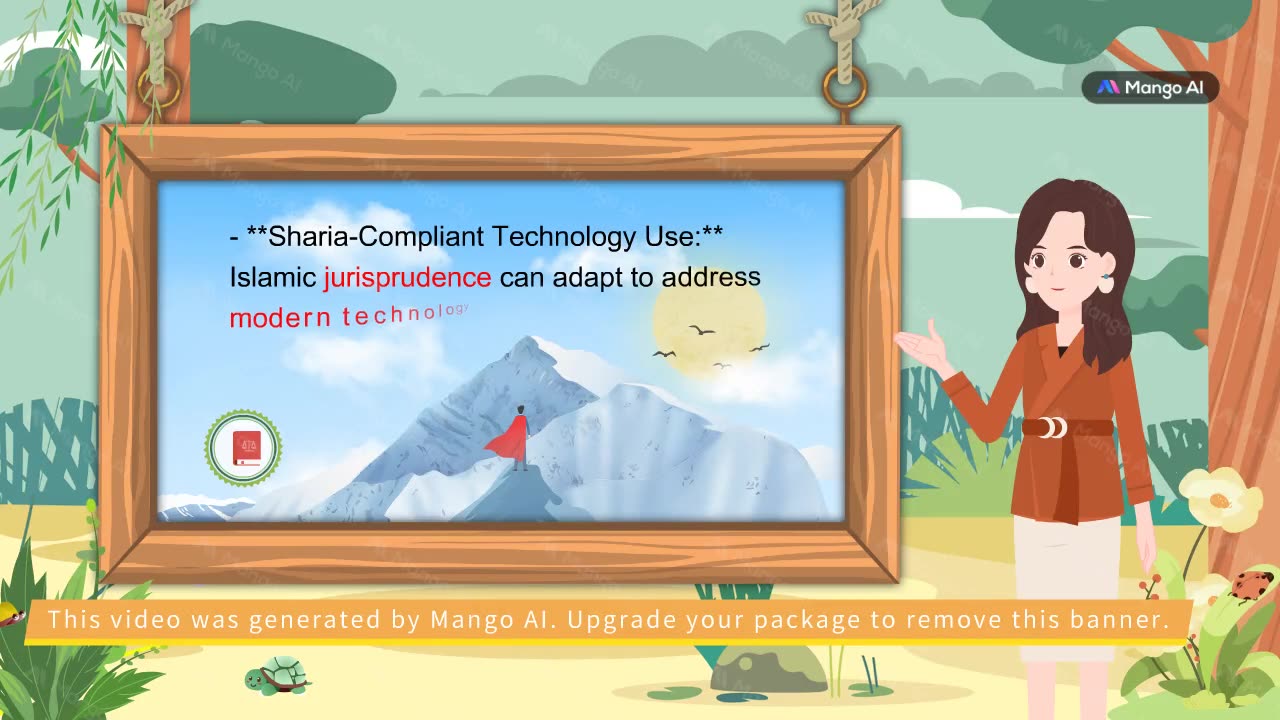Premium Only Content

Modernized Islamic Sharia Laws Technological Integration and Cybercrime:
Your inquiry touches on a broad and complex array of topics related to modernizing Islamic Sharia laws, particularly in the context of technological advancements, social media, cybercrime, economic policies, and societal issues such as divorce. Here's a structured breakdown addressing each aspect:
### Modernized Islamic Sharia Laws
1. **Technological Integration and Cybercrime:**
- **Sharia-Compliant Technology Use:** Islamic jurisprudence can adapt to address modern technology, ensuring its use aligns with ethical and moral guidelines. Scholars can issue fatwas (legal opinions) to guide the appropriate use of technology.
- **Cybercrime:** Sharia law can be updated to address issues like cybercrime. The misuse of social media, cyberbullying, and other digital offenses can be evaluated through the lens of Sharia to establish clear guidelines and consequences.
2. **Economic Policies and Financial Laws:**
- **Islamic Finance:** Modern Sharia-compliant financial institutions can develop policies to regulate investments, banking, and stock markets. Principles like the prohibition of riba (usury) and the encouragement of profit-sharing models (e.g., Mudarabah and Musharakah) are central.
- **Economic Prosperity:** New models can be devised to ensure economic growth while maintaining social justice, equitable wealth distribution, and adherence to Islamic ethics.
3. **Social Issues and Divorce:**
- **Marriage and Divorce:** Sharia laws on marriage and divorce can be modernized to ensure fairness and justice, taking into account contemporary societal changes. This includes addressing issues related to women’s rights, custodial matters, and marital responsibilities.
- **Social Sciences:** Islamic social sciences can provide frameworks for understanding and solving contemporary societal issues, integrating traditional values with modern knowledge.
4. **Legal Standards and Infrastructure:**
- **Policy Development:** Regular updates to legal standards and strategies can be implemented to reflect advancements in technology and changes in societal norms. This involves continuous ijtihad and consultation with scholars.
- **Infrastructure:** Technological advancements can be used to improve legal infrastructure, making Sharia-compliant services more accessible and efficient.
5. **Native Languages and Social Media:**
- **Language Use:** Addressing the use of slang and inappropriate language on social media involves setting clear guidelines that respect cultural and religious sensitivities.
- **Social Media Policies:** Islamic principles can be integrated into social media usage policies to prevent misuse and promote respectful communication.
### Practical Steps for Implementation
1. **Scholarly Engagement:** Engage with Islamic scholars and jurists to interpret traditional texts in light of modern challenges.
2. **Community Involvement:** Involve community leaders and the public in discussions about modernizing Sharia laws to ensure they meet the needs of the community.
3. **Educational Programs:** Develop educational programs to raise awareness about the updated laws and their implications.
4. **Legal Reforms:** Implement legal reforms through proper legislative channels, ensuring they are well-documented and accessible.
For an alternative chat experience with further insights, consider using [Hix.ai Chat](https://hix.ai/chat). https://youtu.be/12ZlsodrmnM
https://www.Iinf@official Ai softwareapplication'sdesigntechnologieslaws.com
kidsacademy14a@gmail.com
http://www.facebook.com/pk
http://www.instagram.com/pk
http://www.linkedin.com/pk
-
 1:57:38
1:57:38
The Charlie Kirk Show
2 hours agoThe MAGA Evolution + Doge Dot Gov | Kane, Hammer, Clark | 2.13.2025
64.3K17 -
 7:58
7:58
SLS - Street League Skateboarding
22 hours agoJAMIE FOY'S TOP MOMENTS IN SLS! All The 9's 🔥
15.1K1 -
 12:45
12:45
FirearmFreedom
8 hours ago $0.02 earnedThe Mini-14 SBR of My Dreams-AC-556 Perfection!
361 -
 LIVE
LIVE
SternAmerican
23 hours agoIntegrity in Action call With Steve Stern and Raj Doraisamy Thursday, February 13th 1:50 PM EST
466 watching -
 1:00:30
1:00:30
The Dan Bongino Show
4 hours agoCommunist Libs Are Causing A “Constitutional Crisis” (Ep. 2422) - 02/13/2025
599K1.44K -
 DVR
DVR
TheAlecLaceShow
4 hours agoGuests: Senator Marsha Blackburn, Grant Cardone, J Michael Waller | The Alec Lace Show
9.9K1 -
 1:02:09
1:02:09
Grant Stinchfield
2 hours ago $1.73 earnedThis is Why They Want Trump Dead... Exposure IS Now His Best Protection
12.3K6 -
 LIVE
LIVE
The Dana Show with Dana Loesch
2 hours agoDOGE SLASHES THROUGH DEPARTMENT OF EDUCATION | The Dana Show LIVE On Rumble!
771 watching -
 2:00:44
2:00:44
Benny Johnson
3 hours agoTrump FIRES All Federal Prosecutors, Pam Bondi CHARGES Letitia James! NY Flips MAGA!? RFK Vote LIVE
93.2K143 -
 53:31
53:31
The Rubin Report
4 hours agoWhat Democrats Got Wrong & What They Can Learn from Trump | Ro Khanna
67.8K56